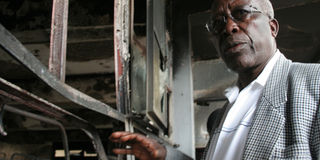Crisis talks as riots rock more schools

Education Minister Prof Sam Ongeri inspects the damage after a dormitory at Nairobi's Upper Hill High School was set ablaze, killing on student and leaving another seriously injured. PHOTO/MICHAEL MUTE
What you need to know:
- Crisis has affected over 300 schools in the last one month
- Internal Security minister George Saitoti attributes the strikes to drug abuse among students.
- Tourism minister Najib Balala adds his voice to the debate and calls for the re-introduction of the cane.
The Government was Sunday jolted into action by the rising cases of student riots with Education minister Sam Ongeri chairing a crisis meeting with key players in the sector.
As the key leaders in the education and security sectors were seeking a solution to the crisis that has affected over 300 schools in the last one month, Tourism minister Najib Balala said the ban on caning should be lifted.
Meanwhile, the wave of strikes continued Sunday, with students from Mbuguti Secondary School in Thika burning nine buildings in their school while others in Kilifi torched a dormitory.
Drug abuse
During Sunday’s meeting, Internal Security minister George Saitoti attributed the strikes to drug abuse among students. He urged wananchi to help check the trend as police investigate the matter.
The meeting resolved to form a committee of top education experts to investigate the wave of unrests that have paralysed learning in over 300 schools in the last one month.
One of the team’s tasks will be to write a report detailing the reasons behind the violence and make recommendations on how the crisis can be avoided in future.
The team is expected to present its report to the Education minister Sam Ongeri this morning.
On Wednesday, Prof Ongeri is scheduled to issue a ministerial statement on the unrests.
Yesterday, the minister confirmed that the team will assess the reports on unrests in each province separately to ascertain the causes of the riots.
“It is from these reports that we are going to come up with a way to end this crisis,” said Prof Ongeri, moments after chairing the crisis meeting.
He warned students that those who commit crimes during the protests will be dealt with according to the law.
Implemented
Asked why they had not implemented some of the reports that had been prepared after similar unrests in the past, the minister said the Government had implemented some.
He said as much as the reports were not in the public domain, it would be wrong to accuse the government of laxity in implementing the recommendations.
Students interviewed by the Nation called for the scrapping of mock examinations, saying they were too difficult and only served to demoralise them ahead of the national examinations. They also blamed school administrators for what they said was failure to give them an avenue of expressing their grievances.
Education Permanent Secretary Karega Mutahi said the current strikes were being caused by a fear that mock results would be used to determine Kenya Certificate of Secondary Examinations results.
“Many Form Four students have refused to do their examinations for fear that the results will determine their grades in this year’s KCSE,” Prof Mutahi said.
Some students said they had received the information and many were unwilling to sit for the papers, saying they are more difficult that the actual exam.
In a report carried by the Nation last week, teachers warned that the situation was beyond their control, saying their hands were tied when it comes to enforcement of discipline. Others attributed the strikes to post-election violence.
Speaking to the Nation, Knut secretary general Francis Ng’ang’a called on the Government to review the ban on caning. He said the approach of enforcing discipline in schools needed a fresh look. He also appealed for an overhaul of the curriculum to make it less stressful to students.
The Kenya Secondary School Headteachers Association chairman Cleophas Tirop said the current curriculum was too broad and unfriendly to learners.
“Students are supposed to learn a lot and keep it for four years before they are examined. This is causing undue pressure on the learners, driving many into drugs and alcoholism,” he said.
Tourism minister Najib Balala added his voice to the debate and called for the re-introduction of the cane.
He said the ban on corporal punishment had complicated efforts of maintain discipline among students.
“It is unfortunate teachers’ hands are tied when it comes to disciplining students. We have embraced foreign ideologies to the detriment of our own systems of disciplining children,” he said during a prize-giving day at Jaffery primary school in Mombasa.
The Association of Professional Teachers of Kenya said the Government was not acting fast on the matter.
“The Government has not been committed to addressing the root causes of the strikes in our schools,” said Mr Abraham Kawewa, the national chairman of the association.
Optimism
But Vice-President Kalonzo Musyoka expressed optimism that the Ministry of Education was capable of bringing the situation under control soon.
He told the Nation that it was now becoming worrying that the school strikes were taking a destructive turn. He said that the Government was concerned that the situation was leading to the loss of lives and property worth millions of shillings.
“It is regrettable that some of these strikes have led to the tragic loss of life. Every effort should be made to bring normalcy to our schools,” he said.
Additional reporting by Oliver Mathenge, Benjamin Muindi, Oliver Musembi, Muchemi Wachira, Charles Wanyoro and Anthony Njagi




